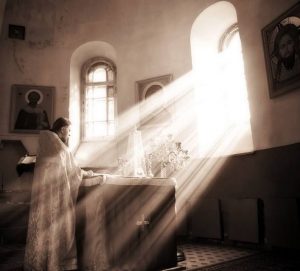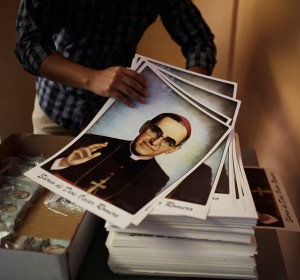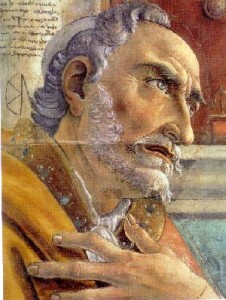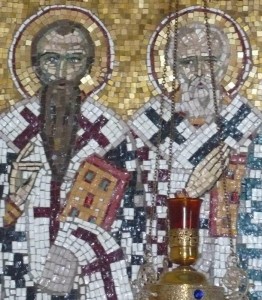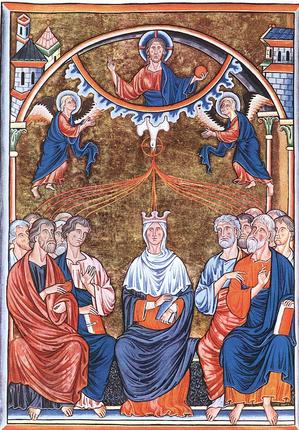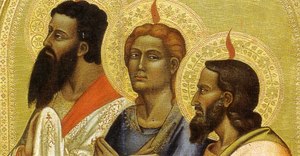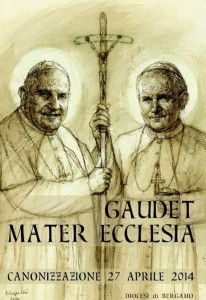 Today, Sunday, 27 April 2014, Pope Francis recognized as saints Popes John XXIII and John Paul II. Also present was Benedict XVI, pope emeritus, concelebrating Holy Mass. He say among the cardinals. More than 90 heads of state, other secular leaders among with more than a thousand bishops and 150 cardinals were present with more than a million people.
Today, Sunday, 27 April 2014, Pope Francis recognized as saints Popes John XXIII and John Paul II. Also present was Benedict XVI, pope emeritus, concelebrating Holy Mass. He say among the cardinals. More than 90 heads of state, other secular leaders among with more than a thousand bishops and 150 cardinals were present with more than a million people.
At the heart of this Sunday, which concludes the Octave of Easter and which John Paul II wished to dedicate to Divine Mercy, are the glorious wounds of the risen Jesus.
He had already shown those wounds when he first appeared to the Apostles on the very evening of that day following the Sabbath, the day of the resurrection. But, as we heard, Thomas was not there that evening, and when the others told him that they had seen the Lord, he replied that unless he himself saw and touched those wounds, he would not believe. A week later, Jesus appeared once more to the disciples gathered in the Upper Room, and Thomas was present; Jesus turned to him and told him to touch his wounds. Whereupon that man, so straightforward and accustomed to testing everything personally, knelt before Jesus with the words: “My Lord and my God!” (Jn 20:28).
The wounds of Jesus are a scandal, a stumbling block for faith, yet they are also the test of faith. That is why on the body of the risen Christ the wounds never pass away: they remain, for those wounds are the enduring sign of God’s love for us. They are essential for believing in God. Not for believing that God exists, but for believing that God is love, mercy and faithfulness. Saint Peter, quoting Isaiah, writes to Christians: “by his wounds you have been healed” (1 Pet 2:24, cf. Is 53:5).
Saint John XXIII and Saint John Paul II were not afraid to look upon the wounds of Jesus, to touch his torn hands and his pierced side. They were not ashamed of the flesh of Christ, they were not scandalized by him, by his cross; they did not despise the flesh of their brother (cf. Is 58:7), because they saw Jesus in every person who suffers and struggles. These were two men of courage, filled with the parrhesia of the Holy Spirit, and they bore witness before the Church and the world to God’s goodness and mercy.
They were priests, bishops and popes of the twentieth century. They lived through the tragic events of that century, but they were not overwhelmed by them. For them, God was more powerful; faith was more powerful – faith in Jesus Christ the Redeemer of man and the Lord of history; the mercy of God, shown by those five wounds, was more powerful; and more powerful too was the closeness of Mary our Mother.
In these two men, who looked upon the wounds of Christ and bore witness to his mercy, there dwelt a living hope and an indescribable and glorious joy (1 Pet 1:3,8). The hope and the joy which the risen Christ bestows on his disciples, the hope and the joy which nothing and no one can take from them. The hope and joy of Easter, forged in the crucible of self-denial, self-emptying, utter identification with sinners, even to the point of disgust at the bitterness of that chalice. Such were the hope and the joy which these two holy popes had received as a gift from the risen Lord and which they in turn bestowed in abundance upon the People of God, meriting our eternal gratitude.
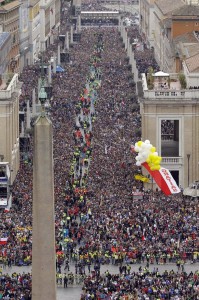 This hope and this joy were palpable in the earliest community of believers, in Jerusalem, as we read in the Acts of the Apostles (cf. 2:42-47), as we heard in the second reading. It was a community which lived the heart of the Gospel, love and mercy, in simplicity and fraternity.
This hope and this joy were palpable in the earliest community of believers, in Jerusalem, as we read in the Acts of the Apostles (cf. 2:42-47), as we heard in the second reading. It was a community which lived the heart of the Gospel, love and mercy, in simplicity and fraternity.
This is also the image of the Church which the Second Vatican Council set before us. John XXIII and John Paul II cooperated with the Holy Spirit in renewing and updating the Church in keeping with her pristine features, those features which the saints have given her throughout the centuries. Let us not forget that it is the saints who give direction and growth to the Church. In convening the Council, John XXIII showed an exquisite openness to the Holy Spirit. He let himself be led and he was for the Church a pastor, a servant-leader, led by the Spirit. This was his great service to the Church; he was the pope of openness [NB: from editor docility] to the Spirit.
In his own service to the People of God, John Paul II was the pope of the family. He himself once said that he wanted to be remembered as the pope of the family. I am particularly happy to point this out as we are in the process of journeying with families towards the Synod on the family. It is surely a journey which, from his place in heaven, he guides and sustains.
May these two new saints and shepherds of God’s people intercede for the Church, so that during this two-year journey toward the Synod she may be open to the Holy Spirit in pastoral service to the family. May both of them teach us not to be scandalized by the wounds of Christ and to enter ever more deeply into the mystery of divine mercy, which always hopes and always forgives, because it always loves.
 We are fast approaching the great feast of Pentecost. A saint to attend to is St. Basil the Great.
We are fast approaching the great feast of Pentecost. A saint to attend to is St. Basil the Great.
